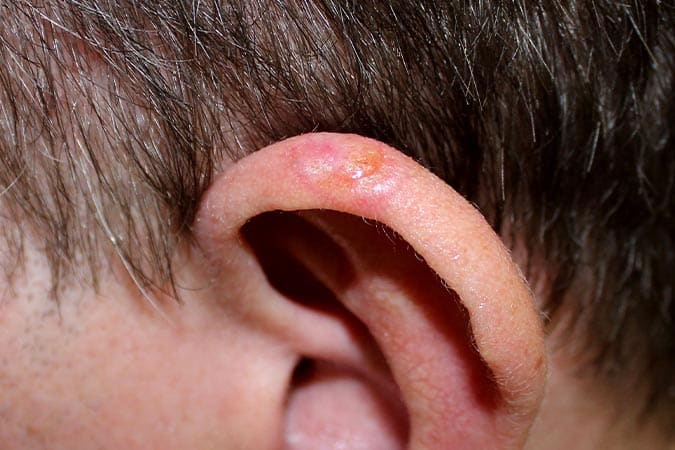What is Basal Cell Carcinoma?
Basal cell carcinoma is a common form of skin cancer. It begins in the basal cells, which are a form of cell within the skin that creates new skin cells when old ones die off. Most basal cell carcinomas are believed to be caused by long-term exposure to ultraviolet (UV) light from sunlight or tanning beds. It usually develops in areas of the body that are often exposed to the sun, such as the head and neck. However, it can develop in other parts of the body as well.
Basal cell carcinomas appear as a new spot on the skin, such as a lesion that will not heal. Common signs of this form of skin cancer include:
- A pearly white, pink, or flesh-colored bump. This may bleed and scab over.
- A brown, blue, or black lesion.
- A flat, reddish, scaly patch, or skin that grows over time.
- A waxy, white, scar-like lesion without a defined border.
Who is a Good Candidate for Basal Cell Carcinoma Treatment?
Individuals who see changes in the appearance of their skin, such as a new growth or a change in an existing growth, should see a dermatologist. A consultation with one of our team members is needed to properly diagnose and treat your skin. Contact our office today to get started!
What to Expect During Basal Cell Carcinoma Treatment?
The main goal of basal cell carcinoma treatment is to completely cure the cancer. The type of treatment that is right for you will depend on the type, size, and location of your cancer. Treatment options include:
Surgical excision: Your dermatologist will cut out the cancerous lesion as well as a margin of safety. The excised skin is examined under the microscope to ensure that no cancer cells remain.
Mohs surgery: The skin cancer is removed layer by layer. Each layer is examined under a microscope until all cancer cells are gone.
Cryosurgery: The cancer cells are frozen using liquid nitrogen. This technique is often used for treating superficial skin cancer.
Topical treatments: Prescription creams such as imiquimod or 5-fluorouracil may be used to treat small, thin basal cell carcinomas when surgery is not an option.
Curettage and electrodesiccation: Involves removing the surface of the skin cancer using an instrument called a curette. The base of the cancer is then seared using an electric needle.
Radiation therapy: Utilized for individuals, especially geriatric patients, who may not be good candidates for surgical treatments.
Vismodigib: Used for advanced basal cell carcinoma that is locally aggressive, metastatic, or unresectable.
Basal Cell Carcinoma FAQs
Who has a higher risk of developing basal cell carcinoma?
Is there downtime needed after basal cell carcinoma treatment?
What are the available basal cell carcinoma treatment options?
What are the common signs of basal cell carcinoma?
What is basal cell carcinoma?
Following Basal Cell Carcinoma Treatment
Following treatment, the basal cell carcinoma should be completely eliminated. Downtime will depend on the treatment technique that was used and how large your cancer was. Your dermatologist will provide you with specific instructions on how to properly care for your treatment site following your procedure. If you have any post-treatment questions, do not hesitate to contact our office.
Schedule a Consultation
If you have noticed a new or changing lesion on your skin, it is important to have it assessed by an expert in dermatology. Our providers are adept in the diagnosis and treatment of skin cancer. Contact our office today to schedule your consultation to ensure a safe and healthy you!

Get Started With A Visit!
Fill out the form below and we will reach out to you shortly to schedule an appointment.